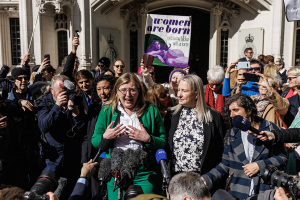Death by hanging: Man facing execution for ‘blasphemous’ WhatsApp posts

Yahaya-Sharif Aminu, who was sentenced to death in 2020 for sharing allegedly blasphemous song lyrics on WhatsApp that offended Islam, remains in prison in Nigeria as he awaits a Supreme Court appeal. United Nations experts have called for his immediate and unconditional release, highlighting concerns over human rights violations.
The U.N. experts — including Alexandra Xanthaki, special rapporteur in the field of cultural rights; Nazila Ghanea, special rapporteur on freedom of religion or belief, and Irene Khan, special rapporteur on the promotion and protection of the right to freedom of opinion and expression — issued a statement urging the Nigerian government to abolish the death penalty for blasphemy, according to the legal advocacy group ADF International, which has been supporting Sharif-Aminu’s appeal since November 2022.
“Mr. Sharif-Aminu has been in prison for too long for exercising his human rights,” the experts stated, urging the Supreme Court to prioritize his case and ensure compliance with international human rights obligations, as quoted in a statement by ADF International. They also called on the government to review his case, protect his rights, and ensure his well-being.
In August 2020, an Upper Sharia Court in Kano, Nigeria, sentenced Sharif-Aminu to death by hanging for a song he composed about the Islamic prophet Muhammad. The Kano State High Court quashed the conviction in January 2021, citing procedural irregularities, and ordered a retrial. The Court of Appeal upheld this decision in August 2022.
Despite these rulings, Sharif-Aminu remains in detention, challenging the retrial order at the Supreme Court.
Sean Nelson, legal counsel for ADF International, expressed gratitude to global advocates for their support. “While the international community demands action, Yahaya continues to languish in prison awaiting a hearing at the Supreme Court of Nigeria,” Nelson said, urging Nigerian officials to heed global leaders’ calls, release Sharif-Aminu and abolish blasphemy laws that violate fundamental human rights.
Kola Alapinni, international human rights lawyer and legal counsel for Sharif-Aminu, referred to the perilous state of religious freedom in Nigeria. “As long as religious minorities are imprisoned for mere peaceful expression, religious freedom is imperiled in Nigeria,” Alapinni stated.
The persecution of religious minorities, including Christians and minority Muslims, is severe in Nigeria. According to recent reports, over 7,000 Christians were killed for their faith last year, with at least 200 murdered by militants in Plateau State during Christmas.
The U.S. Commission on International Religious Freedom (USCIRF) recommended designating Nigeria as a “Country of Particular Concern,” citing Sharif-Aminu’s case.
Members of Congress have passed resolutions calling for greater U.S. action in response to Nigeria’s religious freedom crises. They have also drawn attention to religious prisoners of conscience and egregious blasphemy laws in Nigeria.
The U.K. Parliament has also condemned Sharif-Aminu’s sentence and imprisonment. “The UK Government opposes the death penalty in all circumstances. We will continue to raise Mr. Sharif-Aminu’s case as he appeals his sentence,” stated the Parliament, conveying their support for freedom of religion and belief in Nigeria.
“Should the death sentence be re-confirmed by a court, the government must issue a stay of execution until Nigeria’s laws comply with its international human rights obligations in matters relating to the death penalty,” the U.N. experts said, according to Premium Times.





























